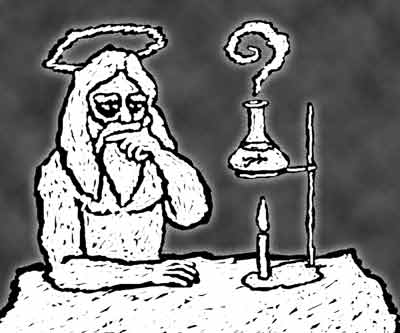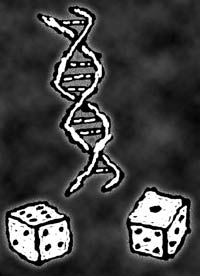

Evolution Without God

E-Mail Us
Your Comments
|
 Evolution Without God
Evolution Without God
by Gary Sloan
art/Greg Rebis
According to a 1997 Gallup poll, only 10% of Americans believe that life originated and evolved through naturalistic processes unmediated by supernatural force or intelligence, the view (sometimes called nontheistic evolution) held by most evolutionary scientists.
About 45% of Americans favor theistic evolution, a.k.a. intelligent-design theory (IDT). While they believe species evolve from antecedent species, they think God guides the process and created the first living cell. The remaining 45% or so of Americans essentially embrace the miraculous account(s) of creation in Genesis. They think all animals descend from the fully formed prototypes God created fewer than ten thousand years ago.
Only 7% of the inhabitants of the United Kingdom accept the biblical scenario. Obviously, the American educational establishment and enlightened members of the media have their work cut out. The voices of obscurantism are drowning out the voices of reason.
Recently, in Louisiana, my home state, a large newspaper solicited letters and guest columns on evolution. Of the twenty-seven published responses, only one, mine, plumped for nontheism. Two biology professors defended intelligent design as did a physician and two lawyers. Sixteen respondents, some resorting to labyrinthine exegeses, championed various renditions of the Genesis myth.
Given the rampant ignorance of the case for nontheistic evolution, perhaps a new brief is in order.
To begin with, the evidence for Darwinian evolution is so far-ranging and compelling that no impartial observer, surveying the vast accumulation of data, can reasonably deny it. Evidence from the fossil record, comparative anatomy, embryology, biochemistry, molecular biology, and cell biology all converges at a single point: Life began about 3.5 billion years ago with single-celled organisms (prokaryotes), and gradually, during this almost unimaginably vast expanse of time, evolved forms of increasing complexity. While many wrinkles have yet to be ironed out, the general contours of the process are unmistakable.
Creationists routinely lodge three specious objections to evolution.
Evolution, they say, violates the Second Law of Thermodynamics, which holds that, as systems lose energy, they degrade to states of increasing disorder. They exhibit entropy. Evolution moves in the other direction, from disorder to order, gaining instead of losing energy. Here, the anti-evolutionists leave their flank exposed: The Second Law applies only to isolated systems, ones in which energy from the outside cannot enter nor energy from within exit like the universe as a whole. The earth is not an isolated system. It enjoys a constant influx of energy from the sun. The sun's loss is the earth's gain.
Complex organs like eyes and wings, the creationists further object, had to spring into existence complete, rather than develop from rudimentary precursors, because a partial organ is without utility.
This argument is astonishingly unobservant. Half an organ, nay, one-hundredth of an organ, is better than no organ. While cataract sufferers who have had their lenses surgically removed can't see well without glasses, they are considerably better off than the sightless. Although an animal without lenses can't focus an image, it can detect the looming shadow of a predator and take evasive action. While animals without wings can't fly, some can glide. Between their joints they have flaps of skin, fractional wings, that have survival value. If they fall from a tree at a certain crucial height, the flaps offer air resistance that can mean the difference between life and death. In The Blind Watchmaker and Climbing Mount Improbable, famed evolutionist Richard Dawkins treats the subject at length. Over an eon, minute, incremental modifications can dramatically change the appearance and function of an organ. But, at every stage, the evolving organ has functional value.
Creationists also contend that evolutionary change occurs only within species ("threshold" evolution). The fossil record, they claim, provides no evidence of speciation, the transformation of one species into another.
In truth, many transitional forms exist. But, owing to zoologists' conservative nomenclature, the fact is often blurred. When zoologists discover a specimen intermediate between two known species, they typically classify it as one or the other. Because of this either-or naming practice, what is nominally one species can be a finely graded series of disparate organisms. In Dawkins' words, "No 'missing link', however precisely intermediate it was, could escape the terminological force majeure that would thrust it to one side of the divide or the other."
In Climbing Mount Improbable, Dawkins observes that the most famous "missing link" isn't necessarily missing: "The transition from Australopithecus to Homo habilis to Homo erectus to archaic Homo sapiens to modern Homo sapiens is so smoothly gradual that fossil experts are continually squabbling about how to classify particular fossils." "Smoothly gradual" is the operative phrase. No indisputable gap exists. The right way to look for intermediates, says Dawkins, is "to forget the naming of fossils and look, instead, at their actual shape and size." One then sees that "the fossil record abounds in beautifully gradual transitions."
True gaps in the fossil record exist because many species failed to fossilize. Others fossilized but haven't yet been found.
Nontheistic evolutionists agree with intelligent-design theorists and creationists that the odds of life developing from non-life seem, on the basis of current knowledge, minuscule. True, in some laboratory experiments, when heat is applied to various mixtures of elements thought to simulate conditions on earth four billion years ago, a small number of organic molecules are formed. But nowhere near the number needed, say many biologists, to make a primitive cell.
Because of the seeming improbability of life, proponents of design maintain that the transition from non-life to life required divine intervention. "The finger of God," said the late chemist Brian Silver in The Ascent of Science, "is certainly a tempting way out." Silver resisted the temptation. He says the emergence of a living cell may be less miraculous than it now appears. Perhaps matter has an undiscovered self-organizing principle that conduces to life. Or perhaps scientists are making the wrong assumptions about conditions on the pre-biotic earth. Events that happened over four billion years ago are recalcitrant to reconstructive efforts. Life's so-called "irreducible complexity" may be an illusion wrought by a transient paucity of knowledge.
In any case, statistical improbabilities are notoriously deceptive. In retrospect, most events can be viewed as massively improbable. What are the chances your father would impregnate your mother with the particular sperm from which you are derived? Zillions to one. Toss a coin thirty times and record the sequence of heads and tails. Now, toss the coin another thirty times. The chances of your duplicating the first sequence are one in a billion. Do 150 tosses and the odds of duplicating the sequence are 10 to the 45th power (1 followed by 45 zeroes).  If everybody in the world flipped coins for the rest of their lives, they would have to live about a billion years before anyone replicated your sequence of 150 tosses. They might allege you couldn't have done it without supernatural aid. One can't logically argue that because something highly improbable happens, some occult force had to make it happen that way. If everybody in the world flipped coins for the rest of their lives, they would have to live about a billion years before anyone replicated your sequence of 150 tosses. They might allege you couldn't have done it without supernatural aid. One can't logically argue that because something highly improbable happens, some occult force had to make it happen that way.
Whatever their pretensions to objectivity, design theorists, like biblical creationists, are usually impelled by religious motives.
Why they should find the concept of a Designer comforting, rather than unsettling, is perhaps best explained by psychologists. If a Designer exists, "he" can certainly be intelligent, but, according to human standards of morality, it is an intelligence often directed to ill. Nature is a huge killing field rocked by ceaseless internecine combat. Living creatures spend much of their time ripping other creatures apart or trying to avoid being ripped. Billions of people have died agonizing deaths from genetic flaws subtly shrouded in the innermost recesses of their DNA molecules. The list of ailments that afflict humans and other animals is longer than an anaconda. No human imagination is capacious enough to grasp the quantity of excruciating pain that animals have endured, generation after generation, throughout what Shakespeare called the dark and backward abysm of time. It seems positively callous and irreverent to worship any Being who would wittingly concoct a universal torture chamber.
If, as some design theorists allege, the purpose of evolution is to produce us, why the long prologue? Why not bring us onto the stage immediately, an easy feat for Omnipotence, and forego all the preliminary sound and fury? And why not provide incontrovertible evidence of a teleological scheme (i.e., design)? Why make it reasonable for evolutionary scientists to explain the origin and development of life by appealing strictly to naturalistic mechanisms? Why should God reduce himself to an unnecessary hypothesis?
The concept of design raises more questions than it answers. Candid theists are likely to concede that given four billion years and unlimited power, they could do better than their putative Designer.
In the light of current knowledge, the genesis of life on earth does indeed seem remarkable. But the inferences drawn therefrom shouldn't reach beyond the facts. As Nobel-laureate physicist Steven Weinberg noted, "In a big universe, accidents will happen from time to time."
Gary Sloan retired in 1999 from Louisiana Tech University, where he was George Anding Professor of English. He lives in Ruston, Louisiana. Besides many articles in academic journals, he has written essays on science, religion, and literature for many popular publications, including Free Inquiry, Skeptic, American Atheist, The Humanist, The American Rationalist, and Exquisite Corpse. His article Did Jesus Exist, and Does It Matter? appeared in the Dec. 00/Jan. 01 issue of IMPACT.
Email your feedback on this article to editor@impactpress.com.
|




 If everybody in the world flipped coins for the rest of their lives, they would have to live about a billion years before anyone replicated your sequence of 150 tosses. They might allege you couldn't have done it without supernatural aid. One can't logically argue that because something highly improbable happens, some occult force had to make it happen that way.
If everybody in the world flipped coins for the rest of their lives, they would have to live about a billion years before anyone replicated your sequence of 150 tosses. They might allege you couldn't have done it without supernatural aid. One can't logically argue that because something highly improbable happens, some occult force had to make it happen that way.